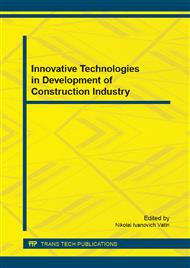[1]
Fu, Y.F., Wong, Y.L., Poon, C.S., Tang, C.A. Stress-strain behaviour of high-strength concrete at elevated temperatures (2005) Magazine of Concrete Research, 57, pp.535-544.
DOI: 10.1680/macr.2005.57.9.535
Google Scholar
[2]
Krichevskiy, A.P. Raschet zhelezobetonnykh inzhenernykh sooruzheniy na temperaturnyye vozdeystviya [Calculation of concrete engineering structures on temperature effects] (1984) Stroyizdat, 148 pp.
Google Scholar
[3]
Toumi, B., Resheidat, M. Influence of High Temperatures on Surface Cracking of Concrete Studied by Image Scanning Technique (2010) Jordan Journal of Civil Engineering, 4, pp.155-163.
Google Scholar
[4]
Korsun, V.I. Napryazhenno-deformirovannoye sostoyaniye zhelezobetonnykh konstruktsiy v usloviyakh temperaturnykh vozdeystviy [Stress-strain state of concrete structures in thermal actions] (2003) DonGASA, 153 pp.
Google Scholar
[5]
Kodur, V. Properties of Concrete at Elevated Temperatures (2014) ISRN Civil Engineering, 15 pp.
DOI: 10.1155/2014/468510
Google Scholar
[6]
Korsun, V.I. K opredeleniyu osnovnykh kharakteristik prochnostnykh i deformatsionnykh svoystv betona dlya usloviy vozdeystviya povyshennykh temperatur [To the definition of the main characteristics of strength and deformation properties of concrete for the conditions of the effect of the elevated temperatures] (1999).
Google Scholar
[7]
Arioz, O. Effects of elevated temperatures on properties of concrete (2007) Fire Safety Journal, 42, pp.516-522.
DOI: 10.1016/j.firesaf.2007.01.003
Google Scholar
[8]
Korsun, V.I., Messaudi, A. K opredeleniyu osnovnykh parametrov diagramm deformirovaniya betona v usloviyakh vozdeystviya povyshennykh temperatur [To the determination of the main parameters of stress-strain diagrams of concrete under the action of high temperatures] (1995).
Google Scholar
[9]
Harmathy, T.Z. Thermal Properties of Concrete at Elevated Temperatures (1970) J. of Materials, 5, pp.47-74.
Google Scholar
[10]
Topcu, I. B, Demir, A. Effect of fire and elevated temperatures on reinforced concrete structures (2002) Bulletin of Chamber of Civil Engineers, Eskisehir Branch, 16: 34, p.6.
Google Scholar
[11]
Korsun, A.V., Melnik, A.V., Nedorezov, A.V. Vliyaniye povyshennykh temperatur na prochnost i deformatsii vysokoprochnykh modifitsirovannykh betonov [The influence of elevated temperatures on the strength and strain of high-modified concrete] (2008).
Google Scholar
[12]
Kottas, R., Seeberger, J. and Hilsdorf, H.K. Strength Characteristics of Concrete in the Temperature Range of 20° to 200°C (1979) Paper in 5th International Conference on Structural Mechanics in Reactor Technology, p.8.
Google Scholar
[13]
Katygrob, V.V., Veretennikov, V.I. Vliyaniye povyshennykh temperatur i urovnya predvaritelnogo nagruzheniya na svoystva tyazhelogo betona [The influence of elevated temperatures and preloading levels on the properties of heavy concrete] (1985).
Google Scholar
[14]
Korsun, V., Vatin, N., Korsun, A., Nemova, D. Physical-mechanical properties of the modified fine-grained concrete subjected to thermal effects up to 200°С (2014) Applied Mechanics and Materials, 633-634, pp.1013-1017.
DOI: 10.4028/www.scientific.net/amm.633-634.1013
Google Scholar
[15]
Korsun, V.I., Bayev, A.M. Vliyaniye temperatur ot -50° do +150°C na prochnost i deformatsii tyazhelogo betona pri ploskom napryazhennom sostoyanii [Effect of temperatures from -50° to +150°C on strength and strain of heavy concrete in plane stress state] (1989).
Google Scholar
[16]
Korsun, V., Korsun, A., Volkov, A. Characteristics of mechanical and rheological properties of concrete under heating conditions up to 200°C (2013).
DOI: 10.1051/matecconf/20130607002
Google Scholar
[17]
Nevgen, N.A. Vliyaniye temperaturnykh i silovykh rezhimov ispytaniya na prochnost betona pri rastyazhenii [Effect of temperature and strength test modes on concrete tension strength] (1983).
Google Scholar
[18]
Borst, R., Peeters, P.J.M. Analysis of concrete structures under thermal loading (1989) Computer Methods in Applied Mechanics and Engineering, 77, pp.293-310.
DOI: 10.1016/0045-7825(89)90079-0
Google Scholar
[19]
Tupov, N.I. O vliyanii povyshennoy temperatury na prochnost i deformativnyye svoystva betona [The influence of elevated temperature on the strength and deformation properties of concrete] (1967) Beton i zhelezobeton, 3, pp.42-43.
Google Scholar
[20]
Hu, B. L., Song, Y.P., Zhao, G.F. Test on Strength and Deformation of Concrete Under Complex Stress at Elevated Temperature (1994) Building Science Research, pp.47-50.
Google Scholar
[21]
Mentes, G.A. et al. Thermal Effects in Reinforced Concrete Structures (1980) Second ASCE Conf. on Civ. Eng. and Nuclear Power, 1, pp.3-1 to 3-5-21.
Google Scholar
[22]
SNiP 2. 03. 04-84. Betonnyye i zhelezobetonnyye konstruktsii, prednaznachennyye dlya raboty v usloviyakh vozdeystviya povyshennykh i vysokikh temperatur [Concrete and reinforced concrete structures designed to operate in conditions of elevated and high temperatures] (1985).
Google Scholar
[23]
Kapriyelov, S.S., Sheynfeld, A.V., Batrakov, V.G. Kompleksnyy modifikator marki MB-01 [Complex modifier MB-01] (1997) Beton i zhelezobeton, 5, pp.38-41.
Google Scholar
[24]
Shishkina, A.A. The porous reactive powder concrete (2014) Construction of Unique Buildings and Structures, 8(23), pp.128-135.
Google Scholar
[25]
GOST 10180-2012. Betony. Metody opredeleniya prochnosti po kontrolnym obraztsam [Concretes. Methods for strength determination using reference specimens] (2013) Interstate Council for Standardization, Metrology and Certification (ISC), 30 pp.
Google Scholar


